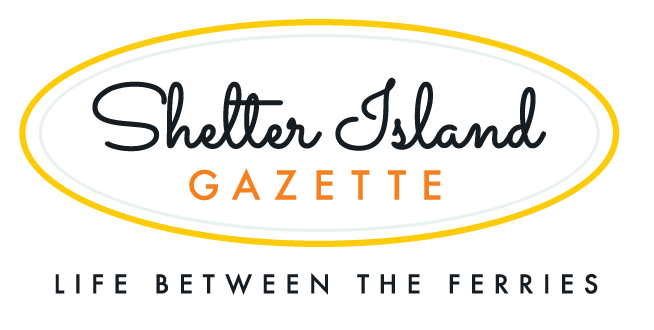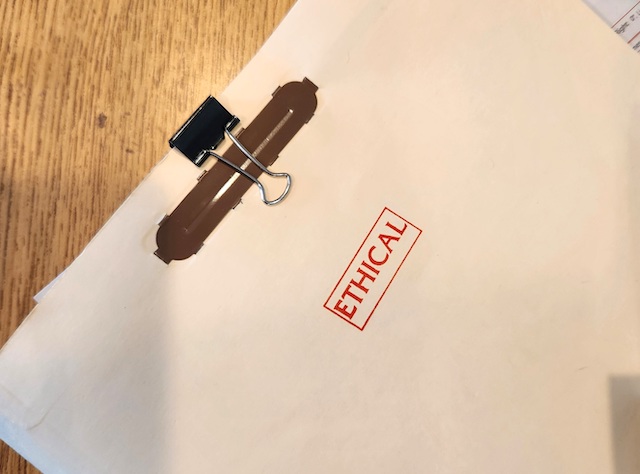The Town Ethics Board continued to refine Ethics Code documents during a meeting interrupted by a real-life demonstration of recusal and doing the ethical thing.
Typically, Ethics Board meetings are held mainly behind closed doors. Monday’s meeting was twice interrupted by precisely the type of private confabs you’d expect these arbiters of best practices to invoke.
The meeting began in an executive session for a discussion relating to a person’s employment. Once the doors opened, the board — Chair Duff Wilson and members Laura Cunningham, Shelby Mundy, and Robert Raiber present in Town Hall and Deborah Grayson on Zoom — continued a review begun at last month’s meeting of Ethics Code documents posted on the Town website.
Their focus has been improving the plain language version, simplifying the code’s dense legalese. The goal is to make the ideas more readily accessible to the busy Town employees and volunteers required to follow the provisions.
A key concept, Wilson says: “It’s not unusual to have a conflict of interest, but it’s important to disclose it.”
So what’s a conflict of interest?
As the plain language version puts it: “Town employees may find themselves in situations where their own private financial interests may conflict with those of the Town. In other words, what is best for the employee may not be what is best for the Town.”
It notes that state law requires disclosure of certain conflicts of interest and calls upon municipalities to develop rules to address issues not covered by state law. While the Town has long had an Ethics Code, it was overdue for an update.
So, last year, the Town Board empaneled a new Ethics Board. The new group researched and proposed a new Ethics Code, which the Town Board adopted in May.
The Ethics Board aims to “establish clear rules regarding conflicts so that Town employees can avoid conflicts of interest and the public can have confidence in their local government.”
The code differentiates between discretionary and functionary actions. It says employees engage in discretionary actions when they make a decision “that requires the exercise of judgment.”
“Examples would include contracting or purchasing decisions or issuing permit or a waiver from the Town’s permit requirements.”
Functionary actions are non-discretionary, “like issuing fishing and hunting licenses, beach permits, and other situations in which as long as an applicant meets the requirements, they’re entitled to the permit or license.”
Most conflicts of interest arise among employees with discretionary authority over a decision.
Step away
What’s an employee to do when they have a conflict of interest but are confronted by a decision? The plain language version states, “Step away and let others decide.”
This is also called disclosure and recusal. “In most cases, employees who disclose conflicts and recuse themselves from the decision-making process are protected against accusations of impropriety.”
“They’re doing the ethical thing.”
So what does this look like in practice?
“You remove yourself entirely from the deliberations and proceedings,” the plain language version says. “You should not be in the room (or videoconference) when the matter is being discussed or voted on, nor participate in any discussion or communications regarding it.”
Still to come are written examples — hypothetical situations — that describe situations employees may find themselves in, with guidance on how to behave. And the board is working through options for how to best educate those impacted by the code.
Demonstrating recusal
But during the meeting, an opportunity arose for demonstrating recusal when another person arrived for a private chat with the Ethics Board.
Given that he has an ongoing business relationship with the individual outside their Town service roles that specifically pertained to the decision at hand, Wilson announced his conflict and excused himself from the meeting room.
As I was also excluded from the private talk (even NY’s robust sunshine laws keep reporters out of confidential conversations), I joined the Ethics Board chair in the foyer. We chit-chatted until the meeting room doors opened again.
But as Wilson took his seat, one board member inadvertently began to report on the private matter, albeit in general terms.
Wilson politely stopped the discussion, showing that recusal really does mean stepping away and letting others decide. He reiterated that he shouldn’t be included in any conversation or correspondence about the matter.
And that’s what doing the ethical thing looks like.




